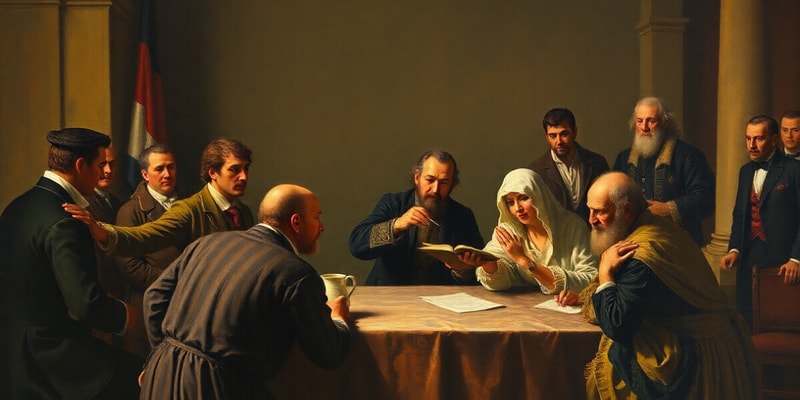Podcast
Questions and Answers
Which characteristic is specific to Classical/Athenian Democracy?
Which characteristic is specific to Classical/Athenian Democracy?
What is a defining feature of Liberal Democracy?
What is a defining feature of Liberal Democracy?
According to Locke, which condition describes the State of Nature?
According to Locke, which condition describes the State of Nature?
What was Madison’s primary concern regarding representative government?
What was Madison’s primary concern regarding representative government?
Signup and view all the answers
Which reason did J.S. Mill NOT advocate for freedom of expression?
Which reason did J.S. Mill NOT advocate for freedom of expression?
Signup and view all the answers
Study Notes
Classical/Athenian Democracy
- Direct democracy: Citizens participate directly in decision-making through assemblies and voting.
- Citizen-legislator: Individuals serve in the assembly and legislative bodies for short terms, balancing public service with private life.
- Focus on civic virtue: Emphasizes the importance of public service, reason, and participation in the political process.
Liberal Democracy
- Representative democracy: Citizens elect representatives to make decisions on their behalf.
- Protection of individual rights: Guarantees fundamental freedoms, such as speech, assembly, and religion.
- Constitutionalism: Limits governmental power and establishes a framework for governance.
State of Nature and Formation of Society (Locke)
- Natural rights: Humans possess inherent rights to life, liberty, and property in the state of nature.
- Social contract: Individuals agree to relinquish certain rights to form a government that can protect their remaining rights and maintain order.
Madison's View on Representative Government in an Extended Republic
- Factions are natural in society and can pose threats to individual liberties.
- A large republic, with a diverse population and a system of checks and balances, helps to limit the influence of factions and prevent tyranny.
Reasons J.S. Mill Advocated for Freedom of Expression
- Truth seeking: Freedom of expression allows for the exchange of ideas, which leads to the discovery of truth.
- Individual development: Self-expression is essential for personal growth and fulfillment.
- Progress: Open debate and criticism stimulate innovation and societal progress.
Studying That Suits You
Use AI to generate personalized quizzes and flashcards to suit your learning preferences.
Related Documents
Description
Explore the key concepts of classical and liberal democracy, focusing on citizen participation, representative systems, and the importance of civic virtue. Additionally, delve into Locke's views on natural rights and the social contract. Understand how these ideas shape modern governance.




